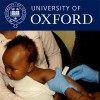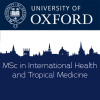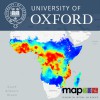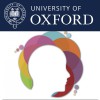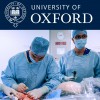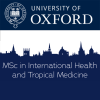Medical Sciences Division

Relevant Links
The Division comprises over 2200 academics and staff, 800 graduate students and 900 undergraduates; about 350 NHS Clinicians and GPs contribute to our teaching activities. In total over 2500 individuals are involved in research.
Medical sciences research at Oxford has maintained its pre-eminent standing, as demonstrated by the results of the 2008 Research Assessment Exercise (RAE). Analysis of the preliminary results published in December 2008 places Oxford medical sciences research as being of the highest quality in the UK in four separate medical science disciplines.
Series associated with Medical Sciences Division
| # | Episode Title | Description | People | Date | |
|---|---|---|---|---|---|
| 1116 | Gut Instinct Ep. 5 - Transplants for alcoholic hepatitis, Single-cell in ulcerative colitis, and haemopray | This month Fitz and Tamsin discuss outcomes from early liver transplant for alcoholic hepatitis, a single-cell study of UC plasma cells, whether haemospray really is the answer in GI bleeds, coeliac epidemiology, and more! | Michael Fitzpatrick, Tamsin Cargill | 24 Jun 2022 | |
| 1115 | Series 2 Episode 1 - The environmental cost of personalised medicine | How does personalised medicine impact on the environment? What does this mean for how we should collect and store data? Gabrielle Samuel talks to us about these issues. | Rachel Horton, Gabrielle Samuel, Susie Weller | 16 Jun 2022 | |
| 1114 | May 2022 Podcast with Neal Benowitz | Jamie Hartmann-Boyce and Nicola Lindson discuss emerging evidence in e-cigarette research and interview Neal Benowitz. | Neal Benowitz, Jamie Hartmann-Boyce, Nicola Lindson | 01 Jun 2022 | |
| 1113 | How do you carry out a realist synthesis of an intervention when there's 'no evidence'? | Joanne Greenhalgh, Professor of Applied Social Research Methodology (University of Leeds) on the experiences of conducting a realist synthesis of the feedback of aggregated patient reported outcome measure (PROMs) data to improve patient care. | Joanne Greenhalgh | 25 May 2022 | |
| 1112 | Gut Instinct Ep. 4 - C. difficile therapeutics, liver spatial genomics, and paediatric hepatitis | What a week! We discuss some cracking papers, including a new microbiome therapeutic for C. diff, spatial transcriptomics in the liver, and the recent epidemic of paediatric hepatitis. | Michael FitzPatrick and Tamsin Cargill | 18 May 2022 | |
| 1111 | April 2022 with Assistant Professor Alex Liber | Jamie Hartmann-Boyce and Nicola Lindson discuss emerging evidence in e-cigarette research and interview Alex Liber. | Jamie Hartmann-Boyce, Nicola Lindson, Alex Liber | 26 Apr 2022 | |
| 1110 | March 2022 with Dr Ailsa Butler | Jamie Hartmann-Boyce and Nicola Lindson discuss emerging evidence in e-cigarette research and interview Dr Ailsa Butler. | Jamie Hartmann-Boyce, Nicola Lindson, Ailsa Butler | 29 Mar 2022 | |
| 1109 | Gut Instinct Ep. 3 - Keto vs Carbs and Livers vs Albumin | We review a few interesting papers from the world of nutrition science and hepatology, plus the usual assortment of bits and bobs from the gastro literature. | Michael Fitzpatrick, Tamsin Cargill | 15 Mar 2022 | |
| 1108 | Knowledge for bright ideas – how research can support innovative health systems | Guest lecturer Dr Nick Fahy is a research group director for health and wellbeing at RAND Europe, where he oversees research in such areas as health systems and healthcare innovation, and the behavioural and social determinants of health and wellbeing. | Nick Fahy | 07 Mar 2022 | |
| 1107 | Creative Commons | February 2022 with Professor Billie Bonevski | Jamie Hartmann-Boyce and Nicola Lindson discuss emerging evidence in e-cigarette research and interview Professor Billie Bonevski. | Nicola Lindson, Jamie Hartmann-Boyce, Billie Bonevski | 01 Mar 2022 |
| 1106 | Justice and the Egalitarian Research Imperative | In his new book, 'For the Common Good: Philosophical Foundations of Research Ethics' (Oxford University Press), Prof Alex John London argues that there is a moral imperative to carry out research with human subjects... | Alex John London | 18 Feb 2022 | |
| 1105 | Obsessive Compulsive Disorder – too careful, too nice, and trying too hard | In this practical, myth-busting webinar for staff and students, Paul Salkovskis from the Department of Experimental Psychology explains how OCD works and what needs to happen to overcome it. A Q&A follows, chaired by Cathy Creswell. | Paul Salkovskis, Cathy Creswell | 18 Feb 2022 | |
| 1104 | Creative Commons | Oxford Days II | Presentations from Professor David Sherratt’s Oxford Days – Part 2 | Kim Nasmyth, Russell Brown, Jan Löwe, Christian Lesterlin | 16 Feb 2022 |
| 1103 | Creative Commons | Oxford Days I | Presentations from Professor David Sherratt’s Oxford Days – Part 1 | Bernard Hallet, François-Xavier Barre, Rodrigo Reyes-Lamothe, Anjana Badrinarayanan | 16 Feb 2022 |
| 1102 | Creative Commons | Glasgow Days | Presentations from Professor David Sherratt’s Glasgow Days | Marshall Stark, Colin Stirling, Stephen Bell, Stephen Kowalczykowski | 16 Feb 2022 |
| 1101 | Creative Commons | Sussex Days | Presentations from Professor David Sherratt’s Sussex Days | Mick Chandler, Claudio Stern, Gordon Dougan, Lorraine Symington | 16 Feb 2022 |
| 1100 | January 2021 with Dr Sharon Cox, Episode 12 | In this episode Assistant Professor Jamie Hartmann-Boyce and Dr Nicola Lindson discuss the emerging evidence in e-cigarette research and interview Dr Sharon Cox. This podcast is a companion to the Electronic Cigarettes Cochrane Living Systematic Review. | Jamie Hartmann-Boyce, Nicola Lindson, Sharon Cox | 28 Jan 2022 | |
| 1099 | Coping with grief after a bereavement | In this practical, myth-busting webinar, Department of Experimental Psychology researcher Dr Kirsten Smith discusses the processes that can block the natural resolution of grief as well as some evidence-based suggestions for managing them. | Kirsten Smith, Cathy Creswell | 25 Jan 2022 | |
| 1098 | Martin Vessey | Derek Hockaday interviews Martin Vessey, Emeritus Professor of Public Health, 4 June 2014 | Martin Vessey, Derek Hockaday | 20 Jan 2022 | |
| 1097 | Mike Dunnill | Derek Hockaday interviews Mike Dunnill, researcher, pathologist and former Director of Clinical Studies,10 February 2012. | Mike Dunnill, Derek Hockaday | 20 Jan 2022 | |
| 1096 | Ann Taylor | Derek Hockaday interviews Ann Taylor, researcher and physiologist, 20 January 2016. | Ann Taylor, Derek Hockaday | 20 Jan 2022 | |
| 1095 | Using theory, evidence and person-based co-development to improve infection control during COVID-19 | Until a vaccine can prevent COVID-19, protective behaviours (such as social distancing, handwashing, cleaning/disinfecting) must be used to limit the spread. | Ben Ainsworth | 17 Dec 2021 | |
| 1094 | Health Technology Assessment: Global alignment of systems, stakeholders and emerging trends | This talk will introduce and explore, the global mechanisms and initiatives that align process, strategy and methodology for Health Technology Assessment (HTA). | Neil Bertelsen | 17 Dec 2021 | |
| 1093 | November 2021 with guest Professor Anne Joseph | Jamie Hartmann-Boyce and Nicola Lindson discuss emerging evidence in e-cigarette research and interview Professor Anne Joseph. | Anne Joseph, Jamie Hartmann-Boyce, Nicola Lindson | 02 Dec 2021 | |
| 1092 | 'Why would anyone hesitate to help kids with cancer?' or: understanding competing perspectives on innovations | 'Homebound' students are unable to attend school for health-related reasons. To lessen their predicament, schools have begun experimenting with 'telepresence robots' for remote participation. | Lars Johannessen | 04 Nov 2021 | |
| 1091 | October 2021 with special guest Nicholas DeVito | Jamie Hartmann-Boyce and Nicola Lindson discuss emerging evidence in e-cigarette research and interview Nicholas DeVito. | Nicholas DeVito, Jamie Hartmann-Boyce, Nicola Lindson | 27 Oct 2021 | |
| 1090 | David Tibbs | Derek Hockaday interviews David Tibbs, vascular surgeon, 7 February 2011. | David Tibbs, Derek Hockaday | 04 Oct 2021 | |
| 1089 | Terence Ryan | Susan Burge interviews Terence Ryan, consultant dermatologist and emeritus professor of dermatology, 18 November 2020. | Terence Ryan, Susan Burge | 30 Sep 2021 | |
| 1088 | Michael Gillmer | Derek Hockaday interviews Michael Gillmer, consultant obstetrician and gynaecologist, 27 February 2014. | Michael Gillmer, Derek Hockaday | 27 Sep 2021 | |
| 1087 | David Warrell | Derek Hockaday interviews David Warrell, honorary consultant physician and Emeritus Professor of Tropical Medicine, 24 March 2014. | David Warrell, Derek Hockaday | 27 Sep 2021 | |
| 1086 | Robert Twycross | Derek Hockaday interviews Robert Twycross, physician and pioneer of palliative care and medicine, 7 August 2018. | Robert Twycross, Derek Hockaday | 24 Sep 2021 | |
| 1085 | Joe Smith | Derek Hockaday interviews Joe Smith, consultant urologist, 18 November 2013. | Joe Smith, Derek Hockaday | 23 Sep 2021 | |
| 1084 | September 2021 update to the Cochrane living review of electronic cigarettes for smoking cessation | Jamie Hartmann-Boyce and Nicola Lindson discuss the September 2021 update of their Cochrane living review of electronic cigarettes for smoking cessation, their response to a paper by Pisinger et al 2020 and emerging evidence in e-cigarette research. | Jamie Hartmann-Boyce, Nicola Lindson | 21 Sep 2021 | |
| 1083 | Peter Sleight | Derek Hockaday interviews Peter Sleight, research cardiologist and consultant physician, 22 September 2013. | Peter Sleight, Derek Hockaday | 15 Sep 2021 | |
| 1082 | Chris Redman | Derek Hockaday interviews Chris Redman, obstetric consultant and clinical professor, 13 November 2016. | Chris Redman, Derek Hockaday | 14 Sep 2021 | |
| 1081 | Christopher Paine | Peggy Frith interviews Sir Christopher Paine, consultant clinical oncologist and former Director of Clinical Studies, 25 Jul 2012. | Christopher Paine, Peggy Frith | 14 Sep 2021 | |
| 1080 | John Oxbury | Derek Hockaday interviews John Oxbury, neurologist, 20 November 2013. | John Oxbury, Derek Hockaday | 14 Sep 2021 | |
| 1079 | Richard Moxon | Derek Hockaday interviews Richard Moxon, Emeritus Professor of Paediatrics and former Chairman of Paediatrics, 21 July 2016. | Richard Moxon, Derek Hockaday | 10 Sep 2021 | |
| 1078 | Neil Mortensen | Derek Hockaday interviews Neil Mortensen, consultant colorectal surgeon, 10 November 2014. | Neil Mortensen, Derek Hockaday | 10 Sep 2021 | |
| 1077 | Brian Longworth | Derek Hockaday interviews Brian Longworth, former mechanical technician and engineer at the Radcliffe Infirmary, 31 July 2015. | Derek Hockaday, Brian Longworth | 09 Sep 2021 | |
| 1076 | Grant de Jersey Lee | Derek Hockaday interviews Grant de Jersey Lee, physician and cardiologist, 13 June 2013. | Grant de Jersey Lee, Derek Hockaday | 08 Sep 2021 | |
| 1075 | Jim Holt | Peggy Frith interviews Jim Holt, former Director of Clinical studies for Oxford Medical School, 1 June 2012. | Jim Holt, Peggy Frith | 08 Sep 2021 | |
| 1074 | John Ledingham | Derek Hockaday interviews John Ledingham, professor of Clinical Medicine and former Director of Clinical Studies, 2013. | John Ledingham, Derek Hockaday | 07 Sep 2021 | |
| 1073 | Donald Lane | Derek Hockaday interviews consultant chest physician Donald Lane, 31 Oct 2013. | Donald Lane, Derek Hockaday | 06 Sep 2021 | |
| 1072 | Derek Jewell | Derek Hockaday interviews Derek Jewell, Emeritus Professor of Gastroenterology, 14 Feb 2013. | Derek Jewell, Derek Hockaday | 06 Sep 2021 | |
| 1071 | Trevor Hughes | Interview with Trevor Hughes, neuropathologist and fellow of Green Templeton College, conducted by Derek Hockaday, 2015. | Trevor Hughes, Derek Hockaday | 25 Aug 2021 | |
| 1070 | Tony Hope | Derek Hockaday interviews Tony Hope, Professor of Medical ethics and honorary consultant psychiatrist, 6 May 2014. | Tony Hope, Derek Hockaday | 24 Aug 2021 | |
| 1069 | Peggy Frith | Interview with Peggy Frith, deputy Director of Clinical Studies for Oxford University Medical School and consultant ophthalmologist, conducted by Derek Hockaday, 15 Sep 2015. | Peggy Frith, Derek Hockaday | 24 Aug 2021 | |
| 1068 | Andrew Freeland | Derek Hockaday interviews Andrew Freeland, ENT consultant and surgeon, 22 May 2014 | Andrew Freeland, Derek Hockaday | 23 Aug 2021 | |
| 1067 | Godfrey Fowler | Derek Hockaday interviews Godfrey Fowler, general practitioner and medical scientist, 7 Mar 2014 | Godfrey Fowler, Derek Hockaday | 23 Aug 2021 | |
| 1066 | Pierre Foex | Derek Hockaday interviews Pierre Foex, Emeritus Nuffield Professor of Anaesthetics, 21 November 2018. | Pierre Foex, Derek Hockaday | 23 Aug 2021 | |
| 1065 | Derek Hockaday | Peggy Frith interviews Derek Hockaday, 24 Sep 2020 | Derek Hockaday, Peggy Frith | 23 Aug 2021 | |
| 1064 | Julian Britton | Derek Hockaday interviews Julian Britton, surgeon and former Director of Clinical Studies for Oxford Medical School, 23 Jan 2019. | Julian Britton, Derek Hockaday | 23 Aug 2021 | |
| 1063 | Hung Cheng | Derek Hockaday interviews Hung Cheng, consultant ophthalmological surgeon, 11 February 2015. | Hung Cheng, Derek Hockaday | 10 Aug 2021 | |
| 1062 | Nick Dudley | Derek Hockaday interviews Nick Dudley, consultant surgeon and founder member of the British Association of Endocrine Surgeons, 26 March 2014. | Nicholas Dudley, Derek Hockaday | 10 Aug 2021 | |
| 1061 | David Paterson | Derek Hockaday interviews David Paterson, physiologist and Professor of Cardiovascular Physiology, 8 January 2019. | David Paterson, Derek Hockaday | 10 Aug 2021 | |
| 1060 | Peter Burge | Derek Hockaday interviews Peter Burge, hand surgeon and consultant, 8 August 2014. | Peter Burge, Derek Hockaday | 10 Aug 2021 | |
| 1059 | July 2021 with special guest Dr Katie Myers Smith | Jamie Hartmann-Boyce and Nicola Lindson discuss emerging evidence in e-cigarette research. Dr Katie Myers Smith discusses findings from her recent study. | Jamie Hartmann-Boyce, Nicola Lindson, Katie Myers Smith | 26 Jul 2021 | |
| 1058 | June 2021 with special guest Professor Thomas Brandon | Jamie Hartmann-Boyce and Nicola Lindson discuss emerging evidence in e-cigarette research and interview Professor Thomas Brandon | Thomas Brandon, Jamie Hartmann-Boyce, Nicola Lindson | 28 Jun 2021 | |
| 1057 | Series 1 Episode 2 - Meet the Advisory Board: Dame Mary Archer | In the second episode of the Meet the Advisory Board Series we talked to Dame Mary Archer about personalised medicine in practice, her academic career and her plethora of other roles she has held and is holding at the moment. | Anika Knuppel, Jiyoon Lee, Dame Mary Archer | 25 Jun 2021 | |
| 1056 | Bullying and Anxiety | Eleanor Leigh with panellists Lucy Bowes and Robert Hepach (chaired by Cathy Creswell) give a seminar on bullying and anxiety on Thursday 3rd June 2021. | Eleanor Leigh, Lucy Bowes, Robert Hepach, Cathy Creswell | 07 Jun 2021 | |
| 1055 | May 2021 with special guest Professor Tim Coleman | Jamie Hartmann-Boyce and Nicola Lindson discuss emerging evidence in e-cigarette research and interview Professor Tim Coleman. | Jamie Hartmann-Boyce, Nicola Lindson, Tim Coleman | 26 May 2021 | |
| 1054 | Overcoming Mistrust and Paranoia | Talk and panel discussion with Daniel Freeman and panel members Elizabeth Tunbridge and Kam Bhui. Introduced by Professor Cathy Creswell. | Daniel Freeman, Elizabeth Tunbridge, Kam Bhui, Cathy Creswell | 24 May 2021 | |
| 1053 | The messy realities of qualitative health research | Dr Anne-Marie Boylan and Dr Laura Griffith, explore the value of qualitative health research and discuss what it's really like to undertake qualitative research. | Anne-Marie Boylan, Laura Griffith | 21 May 2021 | |
| 1052 | Understanding and Managing Eating Disorders | This webinar provides useful information about eating disorders and breaks down common myths. Evidence-based treatments will be provided and as well as guidance on what you can do if you, or someone you know, is struggling with eating problems. | Rebecca Murphy, Robin Murphy, Deborah Waller, Cathy Creswell | 12 May 2021 | |
| 1051 | Coping with Trauma | Most of us will experience a traumatic event at some point in our lives. Our sense of self and the world may change and we may experience unwanted distressing memories and feel a wide range of negative emotions. | Anke Ehlers, Mina Fazel, Morten Kringelbach, Cathy Creswell) | 12 May 2021 | |
| 1050 | April 2021 Cochrane living review of electronic cigarettes for smoking cessation update and questions | Jamie Hartmann-Boyce and Nicola Lindson discuss the April 2021 update to their Cochrane living review of electronic cigarettes for smoking cessation and respond to questions from listeners. | Jamie Hartmann-Boyce, Nicola Lindson | 29 Apr 2021 | |
| 1049 | Series 1 Episode 1 - Meet the Advisory Board: Dr Magdalena Skipper | In the first episode of the Meet the Advisory Board Series we talked to Dr Magdalena Skipper to find out about her remarkable career in academia, science publishing and her views on personalised medicine. | Magdalena Skipper | 31 Mar 2021 | |
| 1048 | March 2021 with special guest Professor Caitlin Notley | Jamie Hartmann-Boyce and Nicola Lindson discuss emerging evidence in e-cigarette research and interview Professor Caitlin Notley. | Jamie Hartmann-Boyce, Nicola Lindson, Caitlin Notley | 24 Mar 2021 | |
| 1047 | Gut Instinct Ep. 2 - Long-term drains for ascites, the developing gut, and drugs for obesity | A smorgasbord of research for you this week; we discuss quantitative and qualitative data about long-term drains for ascites, an incredible atlas of the developing gut, drugs for obesity, fibrates for itch, and pharmacokinetics in pregnancy. | Michael Fitzpatrick, Tamsin Cargill | 19 Mar 2021 | |
| 1046 | Leading and teaching Evidence-Based Health Care | Professor Kamal Mahtani and David Nunan interview Professor Paul Glasziou, Director of the Institute for Evidence-Based Healthcare at Bond University, about his experience of leadership and his work in capacity building through teaching and supervision. | Kamal Mahtani, David Nunan, Paul Glasziou | 18 Mar 2021 | |
| 1045 | February 2021 with special guest Dr Rachna Begh | Jamie Hartmann-Boyce and Nicola Lindson discuss emerging evidence in e-cigarette research and interview Dr Rachna Begh. | Jamie Hartmann-Boyce, Nicola Lindson, Rachna Begh | 24 Feb 2021 | |
| 1044 | Gut Instinct Ep.1 - COVID and cancer, ACLF, and the downfall of biomarkers | The first episode! We talk through the impact of COVID-19 on colorectal cancer, transcriptomics in ACLF, the pitfalls of biomarker studies in IBD, microscopic colitis and cancer risk, HBV and PBC treatment, and more... | Michael Fitzpatrick, Tamsin Cargill | 12 Feb 2021 | |
| 1043 | January 2021 with special guest Professor Jasjit Ahluwalia | Jamie & Nicola review 4 new studies & interview Prof Jasjit Ahluwalia. | Jamie Hartmann-Boyce, Nicola Lindson, Jasjit Ahluwalia | 28 Jan 2021 | |
| 1042 | Coronavirus and ‘Disease X’ | Professor Peter Millican interviews the Oxford scientists working at the forefront of research into Disease X | Peter Millican, Sarah Gilbert, Peter Horby, Jimmy Whitworth | 14 Jan 2021 | |
| 1041 | Ebola | Professor Peter Millican begins the final episode of this series in 2014, at the onset of the Ebola outbreak in West Africa. | Peter Millican, Kevin Decock, Katie Ewer, Brian Angus | 14 Jan 2021 | |
| 1040 | HIV/AIDS | In the ninth episode of our History of Pandemics season, Professor Peter Millican leaves the perils of influenza behind, only to discover an entirely new virus: HIV. | Peter Millican, Harold Jaffe, John Frater, Kevin Decock | 14 Jan 2021 | |
| 1039 | The 'Spanish' Flu | Professor Peter Millican arrives in the twentieth century, during the last years of the Great War, to a pandemic which you may have read a lot about during the early coverage of our current COVID outbreak. | Peter Millican, John Oxford, Brian Angus, Claas Kirchhelle | 14 Jan 2021 | |
| 1038 | 'Russian' Flu: the pandemic that wasn't? | In this episode, Professor Peter Millican discusses a controversial outbreak... | Peter Millican, Julia Mannherz, Claas Kirchhelle, Brian Angus | 14 Jan 2021 | |
| 1037 | Cholera | Professor Peter Millican makes it to the nineteenth century to discuss the achievements of John Snow | Peter Millican, Claas Kirchhelle, Brian Angus, Blanche Oguti | 14 Jan 2021 | |
| 1036 | December 2020, with special guest Professor Mark Eisenberg | Jamie Hartmann-Boyce and Nicola Lindson discuss their Cochrane Review and emerging evidence. | Jamie Hartmann-Boyce, Nicola Lindson | 14 Dec 2020 | |
| 1035 | Smallpox, and Jenner | Welcome to the eighteenth century, at a point when Europe is going through another major smallpox outbreak, a disease that by this point has been plaguing populations around the globe for centuries. | Peter Millican, Claas Kirchhelle, Brian Angus, Blanche Oguti | 01 Dec 2020 | |
| 1034 | The Great Plague | in the final plague episode of the series, Professor Peter Millican talks to his guests about the last major outbreak of this horrific disease in seventeenth-century England. | Peter Millican, Paul Slack, Emma Smith, Kees Windland | 01 Dec 2020 | |
| 1033 | The Black Death | Professor Peter Millican arrives in the fourteenth century and meets history's most notorious plague outbreak. | Peter Millican, Samuel Cohn, Blanche Oguti | 01 Dec 2020 | |
| 1032 | The Plague of Justinian | Welcome to the Eastern Roman Empire in the sixth century. This time, Professor Peter Millican discusses a plague that historians and medical experts agree was likely the first plague pandemic humanity experienced. | Peter Millican, Michael McCormick, Abigail Buglass | 01 Dec 2020 | |
| 1031 | Athens: the first plague? | Join Professor Peter Millican in 5th century Athens, a crowded city in the midst of a siege, where a devastating disease had just erupted. | Peter Millican, Tim Rood, Brian Angus, Blanche Oguti | 01 Dec 2020 | |
| 1030 | Exploring the fundamentals of leadership with Professor Carl Heneghan - Part Two | Professor Kamal Mahtani continues his interview with Professor Carl Heneghan, discussing where your motivation as a leader comes from, succession planning, seeking mentoring, how leaders can engage with the wider world. | Kamal Mahtani, Carl Heneghan | 25 Nov 2020 | |
| 1029 | Managing Depression and Low Mood | Sadness and low mood are normal parts of human experience. But what happens when they become more pervasive and disabling? | Willem Kuyken, Catherine Harmer, Andrea Cipriani. | 24 Nov 2020 | |
| 1028 | Overcoming Sleep Problems | What sleep is for, how does it work and how can we deal with tricky sleep problems? This is the second talk in the Department of Experimental Psychology’s Our Mental Wellness series. | Colin Espie, Felicity Waite, Dimitri Gavriloff, Catharine Creswell | 10 Nov 2020 | |
| 1027 | John Ledingham | Peggy Frith interviews John Ledingham, professor of Clinical Medicine and former Director of Clinical Studies, 23 April 2012. | Peggy Frith, John Ledingham, Rosie Fitzherbert Jones | 05 Nov 2020 | |
| 1026 | Exploring the fundamentals of leadership with Professor Carl Heneghan - Part One | Professor Kamal Mahtani interviews Professor Carl Heneghan, exploring his leadership; how it all started, the challenges he has faced, emotional intelligence, the importance of clear communication and being a tortoise rather than a hare as a leader. | Carl Heneghan, Kamal Mahtani | 04 Nov 2020 | |
| 1025 | How do species postpone or even escape from senescence? | Dr Rob Salguero-Gomez, Associate Professor in Ecology, Department of Zoology, gives a talk on lessons for a longer, better human life for the EBHC podcast series. | Rob Salguero-Gomez | 02 Nov 2020 | |
| 1024 | Susan Burge (part 4) | Part 4 of Derek Hockaday's interview with Susan Burge, consultant dermatologist and former Director of Clinical Studies, 22 July 2015. | Susan Burge, Derek Hockaday | 16 Sep 2020 | |
| 1023 | Susan Burge (part 3) | Part 3 of Derek Hockaday's interview of Susan Burge, consultant dermatologist and former Director of Clinical Studies, 22 July 2015 | Susan Burge, Derek Hockaday | 16 Sep 2020 | |
| 1022 | Susan Burge (part 2) | Part 2 of Derek Hockaday's interview of Susan Burge, consultant dermatologist and former Director of Clinical Studies, 22 July 2015. | Susan Burge, Derek Hockaday | 16 Sep 2020 | |
| 1021 | Susan Burge (part 1) | Derek Hockaday interviews Susan Burge, consultant dermatologist and former Director of Clinical Studies, 22 July 2015. | Susan Burge, Derek Hockaday | 16 Sep 2020 | |
| 1020 | Joan Trowell | Derek Hockaday interviews Joan Trowell, consultant physician and former deputy Director of Clinical studies, 5 March 2015 | Joan Trowell, Derek Hockaday | 16 Sep 2020 | |
| 1019 | Chris Winearls (part 2) | Derek Hockaday continues his interview with Chris Winearls, consultant nephrologist and associate professor of medicine, 4 March 2013. | Chris Winearls, Derek Hockaday | 16 Sep 2020 | |
| 1018 | Chris Winearls (part 1) | Derek Hockaday interviews Chris Winearls, consultant nephrologist and associate professor of medicine, 4 March 2015. | Chris Winearls, Derek Hockaday | 16 Sep 2020 | |
| 1017 | Michael Tunbridge | Derek Hockaday interviews Michael Tunbridge, former Director of Postgraduate Medical Education and Training, University of Oxford, 31 January 2014. | Michael Tunbridge, Derek Hockaday | 16 Sep 2020 |
- ‹ previous
- 3 of 14
- next ›

















